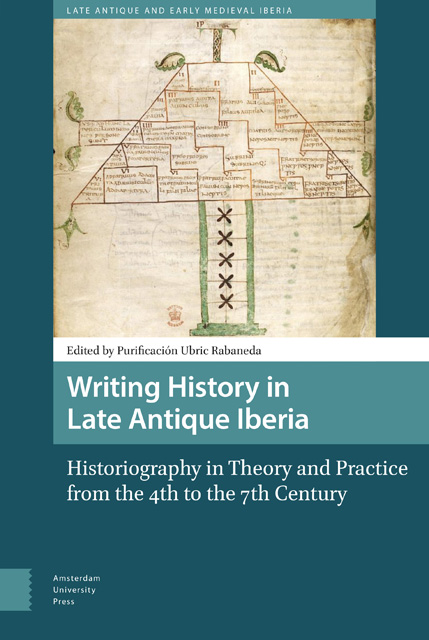 Writing History in Late Antique Iberia
Writing History in Late Antique Iberia Published online by Cambridge University Press: 18 April 2023
Abstract
This chapter addresses a detailed analysis of the temporality present in the hagiographic literature of Late Antiquite Hispania and specifically in the bio-hagiographies of the Visigoth period, a production that is not very abundant in comparative terms with that of other geographical areas, but of great interest. By means of the same one it is evidenced that these compositions use a certainly historical time frame, common characteristic to all biographical narration, but by means of artifices and a story of topical character they manage to transmit to their readers/ listeners an idealised temporal building and, above all, providentialist, always presided over by the divine intervention and its agents, the holy men, constant protagonists of salvific acts.
Keywords: Hispania, Late Antiquity, Visigothic hagiography, biographies, time
Quid est enim tempus? Quis hoc facile breuiterque explicauerit?
Aug., Conf. 11,14,17
Temporalidad y narrativa hagiográfica
Fruto de la visión rectilínea y teleológica de la historia –de la Historia de Salvación- propia del cristianismo, los seguidores de esta religión tienen una fuerte conciencia de la naturaleza del tiempo, de su continuidad e irreversibilidad. Para los cristianos el tiempo siempre hace referencia a una realidad, a algo ya vivido, que se está viviendo o que se espera vivir, todo ello irrepetible y conectado. En consecuencia, pasado, presente y futuro tienen un valor absoluto. De igual forma, antes, ahora y después adquieren un significado relativo o relacional.
Así concebido, el tiempo es un elemento esencial, consustancial, a la narrativa cristiana. El subgénero hagiográfico, por más que peculiar, no pude escapar de esta máxima por sus pretensiones de carácter historiográfico. Y sin embargo, no cabe ver en estos escritos una perfecta sucesión temporal o cronológica.
Dentro de las narraciones hagiográficas contamos con dos tipos principales: los relatos martiriales y las biografías de santos. Por lo que se refiere a los relatos martiriales, en concreto a los comprendidos en el Passionarium Hispanicum , el asunto que nos ocupa, aparentemente, no reviste mayor complejidad. A la par que destaca la presencia de la conjunción cum –junto con sus equivalentes y locuciones-con valor temporal, el llamado cum histórico, aparecen dos tiempos claramente definidos: pasado (la propia narración del martirio, habitualmente encabezada por la conjunción igitur ) y presente (emplazamiento de las reliquias y celebraciones diversas).
To save this book to your Kindle, first ensure no-reply@cambridge.org is added to your Approved Personal Document E-mail List under your Personal Document Settings on the Manage Your Content and Devices page of your Amazon account. Then enter the ‘name’ part of your Kindle email address below. Find out more about saving to your Kindle.
Note you can select to save to either the @free.kindle.com or @kindle.com variations. ‘@free.kindle.com’ emails are free but can only be saved to your device when it is connected to wi-fi. ‘@kindle.com’ emails can be delivered even when you are not connected to wi-fi, but note that service fees apply.
Find out more about the Kindle Personal Document Service.
To save content items to your account, please confirm that you agree to abide by our usage policies. If this is the first time you use this feature, you will be asked to authorise Cambridge Core to connect with your account. Find out more about saving content to Dropbox.
To save content items to your account, please confirm that you agree to abide by our usage policies. If this is the first time you use this feature, you will be asked to authorise Cambridge Core to connect with your account. Find out more about saving content to Google Drive.